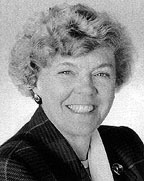Anita Kastner Hotchkiss ’59
 Anita Kastner Hotchkiss ’59 didn’t take the direct route to becoming a lawyer.She started life after Bates as a full-time homemaker after her 1960 marriage to Bates classmate Stephen Hotchkiss. However, following their divorce in 1972, she was faced with the decision of what to do with the rest of her life. “I decided to go to law school, which was the best decision I ever made. I absolutely loved it from day one. It was like coming home when I didn’t even know I had been away,” she said.
Anita Kastner Hotchkiss ’59 didn’t take the direct route to becoming a lawyer.She started life after Bates as a full-time homemaker after her 1960 marriage to Bates classmate Stephen Hotchkiss. However, following their divorce in 1972, she was faced with the decision of what to do with the rest of her life. “I decided to go to law school, which was the best decision I ever made. I absolutely loved it from day one. It was like coming home when I didn’t even know I had been away,” she said.
After her graduation from Rutgers School of Law in 1975, Hotchkiss joined the law firm of Porzio, Bromberg & Newman, where she began practicing trial law. Early in her career, she specialized in personal-injury law, representing doctors and hospitals. “For years we principally represented physicians and later began representing more patients.” Now 75 percent of her case load involves the defense of pharmaceutical companies in claims against medications and medical devices.
Now a principal in the firm, which has offices in Morristown, New Jersey, and New York City, Hotchkiss was recently honored as “one of the twenty most influential women in medicine today” by The Medical Herald. Well known for her high-profile law suits involving the defense of pharmaceutical companies in the area of health care and contraception, Hotchkiss felt “honored and gratified.”
One of her current legal battles deals with contraceptive devices. “A focus of The Medical Herald is contraception and the negative effect on research and development that results from broad-based lawsuits against drug companies,” she said. “Thousands and thousands of people sue drug companies every year, even though there may be very little, if any, medical evidence to support the claims. What has regrettably happened is that the sheer weight of numbers results in products being taken off the market.” The long-term effect, said Hotchkiss, is that American women have fewer contraceptive choices than do women in other countries.
“Choices broaden your control over your life,” she continued. “And a woman should have as many choices as possible when making decisions as to her reproductive life. I think that the country is heading toward a point where all American consumers will have fewer product choices than people in other parts of the world. Liability risks are so high that companies often make decisions not to do research and development rather than run the risk of litigation.”
As an example, Hotchkiss points to Bendectin, a drug prescribed for morning sickness. It is approved by the FDA, but has been taken off the market by its manufacturer because of the cost of litigation.
“Morning sickness can be a life-threatening disease and can result in shock and hospitalization, not to mention considerable discomfort. But because of the fear that the product caused birth defects, hundreds of lawsuits were filed even though there was no scientific proof of medical causation. It cost the company over a hundred million dollars to defend.” Bendectin is no longer sold in the United States, and, according to Hotchkiss, there is currently no product available in the country to treat morning sickness. No company wants to run the risk of making it because the risk of liability is too high.
“There’s no question that some people sustain injuries from products, but in the vast majority of cases that I see, the people within the companies I represent are trying to do the best job that they know how to do. That’s my view, and if I didn’t feel that way, I wouldn’t be comfortable defending them.”
The field of law has been tremendously satisfying for Hotchkiss. “When I got into the profession, I found that law was an area where there were broader opportunities for women than in a lot of other professions. The field has changed dramatically, however, in the last twenty years. It’s tremendously competitive and much more stressful. For someone thinking about becoming a lawyer, I would recommend getting some kind of specialized degree that can be coupled with a law degree — something that will enhance the person’s ability to compete.”
While she’s represented large companies in high-profile court fights with big money at stake, one of Hotchkiss’s most gratifying cases occurred several years ago and involved a little boy. The infant’s parents, who had come to this country from Peru, were each working two jobs and had great plans for this baby. When the baby was only two months old, the mother died in the hospital as a result of gross medical negligence. “One of my happiest days was winning a substantial award for this little boy. By the time we got to trial he was living with his father in a poor neighborhood in an apartment with five other unrelated adults.
“I was able to convince the court that it should release $100,000 of the award so that the father could buy a townhouse in a decent neighborhood. The boy has just started school in a very good school system. Hopefully, through this award, he will be able to live the American dream as his mother had hoped.
“There are many ways to make a difference in the lives of others. Law is one of them. When I can make an impact, as in the case of little Daniel, it’s extremely satisfying.”
By Julie Jackson McMillan ’84